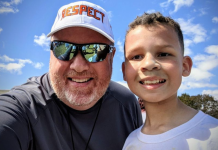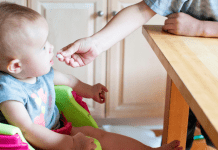Have you heard success stories about potty training toddlers in 3 days? Have you had people around you saying that it was the easiest thing ever? That their children got a hang of it super quickly? Have you consulted parenting blogs and websites and found articles and resources teaching you that potty training your child in 3 days is doable? Me too! And I built an expectation that turned out to be completely different than my child’s reality.
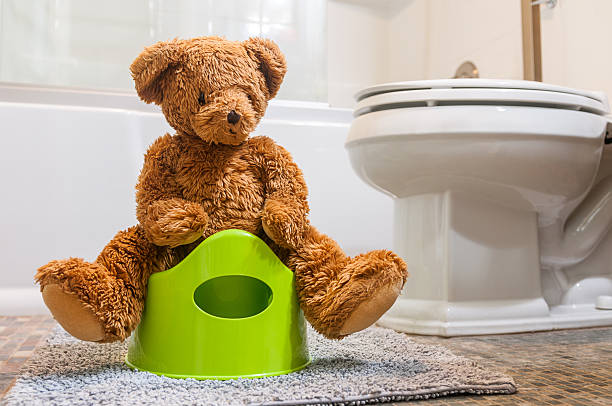
I put a great deal of pressure on my toddler because everyone around me kept telling me that he was ready and I had to make it happen sooner rather than later. He was 2. I bought the cutest little potty, the books, I had the strategy and techniques well-studied and my perfect little plan in place, ready to check this task off my list in 3 days. I actually took the days off from work to stay home and focus entirely on this “project.” Because of work, I tend to manage projects and calculate pretty much everything in my life–creating checklists, timelines, perfect little plans (not the best approach when things don’t go as planned… as is usually the case with children). Little did I know it ended up being a very long process that made both my child and me feel frustrated at times. But we learned, and after a while, we succeeded!
Since it was not a walk in the park, I want to share some recommendations based on my experience with potty-training my son. Tips that I believe will help you build realistic expectations so that you’ll begin this process knowing that every child is different because, as moms, we need to remain calm, patient and wise.
Potty “readiness” is not only physical, it’s also emotional.
“Determining the best time to begin toilet training is not always easy—not only because readiness occurs at different ages for different children, but because your child may be ready in one area of development but not in another.” This is an abstract from an article from Healthy Children, the parenting website from the American Academy of Pediatrics, and it is particularly true in my son’s case.
Dani started showing signs of physiological readiness and interest around his 2nd birthday. However, he was not ready for this big step until much later. How do I know this? He would tell me that he wanted to pee and do #2 but when presented with the potty, he would refuse to use it. I tried almost everything, including taking off his diapers to see if getting wet made him feel uncomfortable, and nothing worked at the beginning. It was only when I stopped pressuring him to use the potty that he started asking for it and using it.
One more important element to keep in mind is that certain emotional situations may influence his ability to get to the potty on time and avoid accidents. With Dani, we learned that when he gets very excited or upset and hasn’t gone to the bathroom in a while, we will definitely have to deal with an extra mini-accident. It is very important to let your child know that you understand him/her and that you will help him/her learn to control their body beyond their feelings and emotions.
Partner with your childcare provider for consistency.
Whatever you are doing at home should be applied at daycare and/or by the nanny and vice versa. In our case, our nanny is a mom of two older boys and had experience potty-training both. She gave me some tips and when I became very frustrated because my method wasn’t working, I decided to let her lead and we started seeing results. She would tell me what worked with Dani in the mornings so that I could provide continuity during the afternoons and evenings. There’s nothing like teamwork to help our children achieve their goals and milestones!
Be patient and ready to clean… a lot.
I never thought I would wipe the floor so many times or wash clothes so full of pee, much less try to take that smell off the carpet. It was so hard and frustrating. But I learned that my child needed to experience these little accidents to understand what the potty is for. I also learned how to watch my reactions and be patient with him. I was scaring him when I showed frustration. I was putting too much pressure on him.
Don’t give up!
It took us months to fully potty-train our son. He had great days with no accidents, horrible days with no progress, and regular days with a little bit of both. At his 3-year old check-up, I told our pediatrician how concerned I was with him not being 100% there. She gave me her typical super calm look and said: “ It’s ok, you still have a full year to make it happen. He will be 100% off his diapers when he is ready. Don’t accelerate his process.” Her voice of wisdom was enough to calm my heart and boost me with patience and perseverance to continue motivating my son. It was all about motivation instead of pressure. Another key lesson!
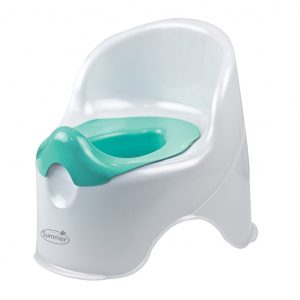
Reward success.
Our nanny and I came up with a system of rewards. Every time he used the potty he got to choose his favorite sticker and place it there, as a reminder of his little wins. We would also throw little parties almost every single time, jumping up and down, cheering for him. He would get so excited that even today, months later, he proudly announces that he peed, expecting our cheers. Another tip to help keep your toddler motivated is to shop for underwear with your child and let him/her choose their favorite ones. Dani wears Paw Patrol and baby sharks.
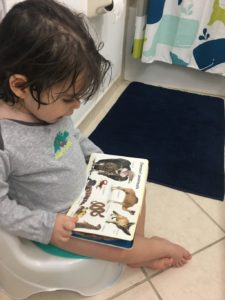
Don’t interrupt the process because it is not convenient for you.
You are getting ready to leave the house and run a few errands. You are tired of washing the carseat because of previous accidents and don’t feel like going through any accidents in public nor the interruption of having to take your child to a public restroom. And so you put a diaper on your child to make it easier for you. But the problem is that by taking a few steps back, the consistency of the training process is broken. Incorporate all potty-training elements into your schedule, so that you can make time for it. Prepare for the worst-case scenario and expect the best from your child.
#2 might come much later.
Dani did not want to use the potty to do #2 for months. We insisted so many times that he actually started telling us just so that we would momentarily put a diaper on him. We are thankful for that! However, we also understood that he was probably scared and uncomfortable on his little potty. We have an open-door policy when we go to the bathroom because we knew he would learn by example and one day, he did. One day he asked to be seated on the big toilet and he did it! Of course, the excitement lasted the whole day. We felt accomplished. I felt it took FOREVER, but we needed to give him time. He was not ready before then and we were just making it worse by forcing it.
Social readiness is the last step in daytime potty training.
Last but not least, our son took us by surprise when we were at a birthday party, and in front of everybody took his pants and underwear off and screamed from the other side of the room that he needed to go pee. It was hilarious and at the same time, we realized we needed to teach him the right way to do it. Come to mom or dad and let us know, so that we may take you to the restroom. There is no need to let the world know. It was a funny moment.
Today, I can tell you that we have learned a lot and feel more prepared to kick off this process with our daughter once she’s ready. She does seem to want to transition soon, as she sees her brother and naturally wants to imitate him. She sits on the potty (with her diapers, of course) or sits her dolls on it. She kind of understands what it is for. She started telling us when her diaper was full at 15 months, much earlier than Dani did.









